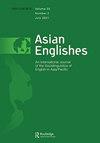Global English Medium Instruction: Perspectives at the crossroads of Global Englishes and EMI
IF 1.8
Q1 LINGUISTICS
引用次数: 11
Abstract
ABSTRACT This conceptual article draws together perspectives from the research fields of Global Englishes and English medium instruction (EMI) to explore shared issues, critical perspectives, and future agendas. While embedded in the reality of English being a dominant global language and academic lingua franca, both Global Englishes and EMI lobby for the promotion of multilingual pedagogies, challenge native speaker hegemony, and highlight the importance of multilingual teachers. Both fields strive to balance pragmatic aims to develop students into global language users, while supporting critical movements to resist centre–periphery views of English. To support the perspectives raised in this article, we draw upon scholarship from and about Asian contexts to emphasise research contributions to both Global Englishes and EMI outside the western hemisphere and Anglosphere. The article concludes with calls for more critical research into EMI, which could be informed by further exploration of research at the crossroads of Global Englishes and EMI.全球英语媒介教学:全球英语与EMI十字路口的视角
这篇概念性文章汇集了全球英语和英语媒介教学(EMI)研究领域的观点,探讨了共同的问题、批判性观点和未来议程。在英语成为占主导地位的全球语言和学术通用语的现实中,全球英语和EMI都为促进多语言教学法而游说,挑战母语霸权,并强调多语言教师的重要性。这两个领域都努力平衡实用主义目标,将学生培养成全球语言使用者,同时支持抵制英语中心边缘观点的批判运动。为了支持本文提出的观点,我们借鉴了亚洲背景下的学术研究,以强调对西半球和英语圈以外的全球英语和EMI的研究贡献。文章最后呼吁对EMI进行更批判性的研究,这可以通过进一步探索全球英语和EMI的交叉研究来获得信息。
本文章由计算机程序翻译,如有差异,请以英文原文为准。
求助全文
约1分钟内获得全文
求助全文
来源期刊

Asian Englishes
LINGUISTICS-
CiteScore
3.30
自引率
18.80%
发文量
34
期刊介绍:
Asian Englishes seeks to publish the best papers dealing with various issues involved in the diffusion of English and its diversification in Asia and the Pacific. It aims to promote better understanding of the nature of English and the role which it plays in the linguistic repertoire of those who live and work in Asia, both intra- and internationally, and in spoken and written form. The journal particularly highlights such themes as: 1.Varieties of English in Asia – Including their divergence & convergence (phonetics, phonology, prosody, vocabulary, syntax, semantics, pragmatics, discourse, rhetoric) 2.ELT and English proficiency testing vis-a-vis English variation and international use of English 3.English as a language of international and intercultural communication in Asia 4.English-language journalism, literature, and other media 5.Social roles and functions of English in Asian countries 6.Multicultural English and mutual intelligibility 7.Language policy and language planning 8.Impact of English on other Asian languages 9.English-knowing bi- and multilingualism 10.English-medium education 11.Relevance of new paradigms, such as English as a Lingua Franca, to Asian contexts. 12.The depth of penetration, use in various domains, and future direction of English in (the development of) Asian Societies.
 求助内容:
求助内容: 应助结果提醒方式:
应助结果提醒方式:


